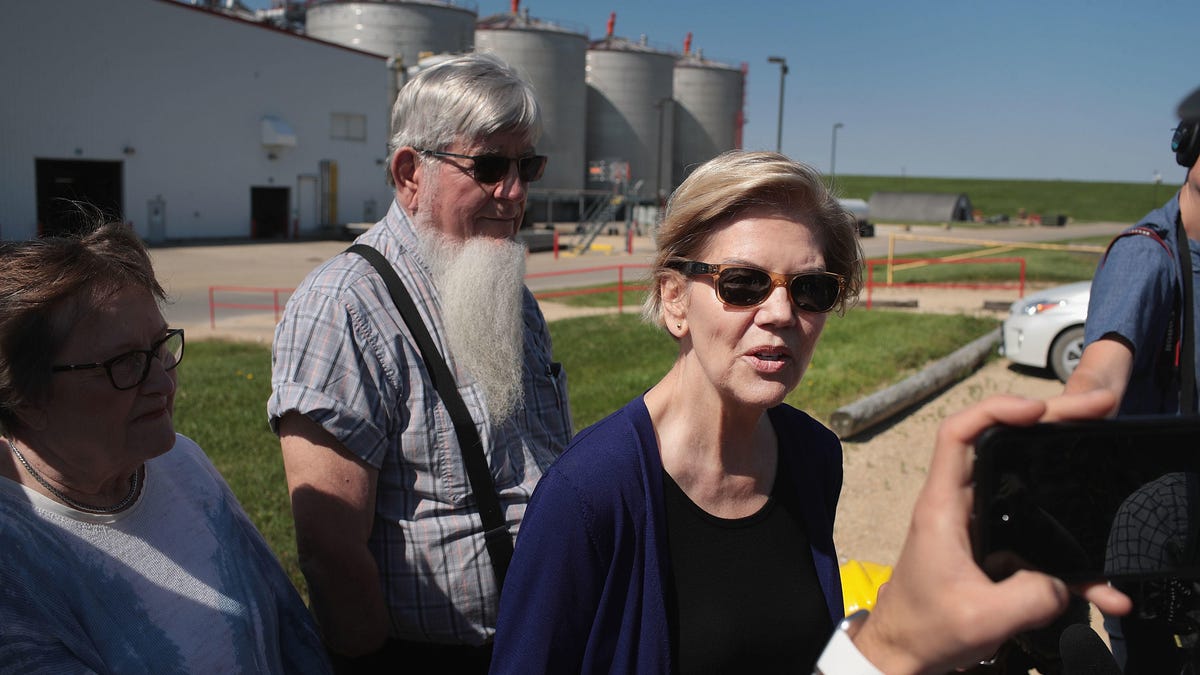Warren promises $85 billion program for rural broadband
The Democratic presidential candidate also says she'd preempt states banning municipally owned broadband networks and promises to reinstate net neutrality.

Elizabeth Warren campaigned in Iowa in June and returns this month to talk up her plan to bring high-speed broadband to underserved rural communities.
Democratic presidential candidate Elizabeth Warren has promised $85 million in federal funding to make sure rural Americans get broadband. And she wants to override states that try to prevent local municipalities from building their own broadband networks.
Warren, a senator from Massachusetts, unveiled her plan Wednesday ahead of a road trip across Iowa. The broadband initiative is part of a bigger proposal called "My Plan to Invest in Rural America," which includes ideas for increasing federal investment in rural health care, payments to farmers to go green, and a slew of other programs directed at farming.
At the heart of the plan is the $85 billion rural broadband initiative, which would distribute federal grants to build new networks. Warren says the plan would bring "fiber infrastructure necessary to bring high-speed broadband to unserved areas, underserved areas, or areas with minimal competition."
The government already provides billions of dollars in subsidies every year to help bring broadband to rural communities. With broadband becoming as essential as running water and electricity to improving people's daily lives and providing a standard of living equal to that of urban and suburban parts of the country, politicians from the left and the right see the issue of bringing these services to communities with limited or no access as one that can help them win the hearts and minds of rural America.
The problem
Warren said in her blog post that roughly 26% of people living in rural areas and 32% of people living on tribal lands don't have access to broadband, compared to about 2% in urban areas, according to Federal Communications Commission figures for 2017.
She also wants to pave the way for local communities to build their own broadband networks. Phone and cable companies have for years lobbied against local community efforts to build their own broadband networks, claiming that using taxpayer dollars to fund such build-outs puts them at a competitive disadvantage. As many as 26 states have passed laws prohibiting such networks.
All the while, big telecommunications companies have been accepting federal government subsidies to build networks in underserved areas, but they've been doing the bare minimum to comply with requirements, Warren said. The result has been less competition, higher prices and inadequate broadband access in underserved areas, she said.
This ends when I'm president," Warren said. "I will make sure every home in America has a fiber broadband connection at a price families can afford. That means publicly owned and operated networks -- and no giant ISPs running away with taxpayer dollars."
Warren's promises come at a time when the FCC, Congress and President Donald Trump have focused a lot of attention on getting broadband to rural communities. The FCC has mainly focused on cutting regulation to spur investment, encouraging cheaper technology alternatives and finding more efficient ways to allocate subsidies. The agency voted last week on a new method of distributing $20 billion of Universal Service Fund subsidies over the next decade as part of the Rural Digital Opportunity Fund.
But the FCC's plan doesn't call for any new money for rural broadband infrastructure. It changes how the FCC awards subsidies to build-out these networks. Instead of providing subsidies only to traditional broadband providers, the FCC's new fund will allow other, nontraditional service providers, like wireless providers and electric co-ops, to compete in a "reverse auction" to get the subsidies to build new networks.
Many parts of rural America, including sections of Iowa, lack broadband internet services.
The nitty-gritty details
Warren says what's needed is an effort like the one in the 1930s to electrify rural parts of the US. She said the issue then was very similar to what rural communities face today.
"Prior to the late 1930s, private electric companies passed over rural communities they felt offered minimal profit opportunities, leaving the families living there literally in the dark," Warren said. "Just like the electric companies 80 years ago, today's biggest internet service providers (ISPs) have left large parts of the country unserved or dramatically underserved."
As a result, her plan cuts out traditional telecom players entirely. Instead, it would focus on providing funds to some of the same entities that helped build-out the electrical grid in underserved areas, like electric co-ops. Her proposal would also preempt state laws that limit the deployment of local government-owned broadband networks. And her proposed grant program would distribute funds only to electricity and telephone cooperatives, nonprofit organizations, tribes, cities, counties and other state subdivisions. The funds will be used only to build fiber infrastructure, presumably leaving out other methods of connectivity, such as wireless broadband.
Warren also promised to appoint as FCC commissioners only people who will restore net neutrality, so that the broadband providers are regulated as "common carriers." The Obama-era rules, which prevented broadband companies from slowing down or blocking access to the internet, were controversial. The Republican-led FCC repealed the rules in 2017. The heart of the debate centered on the reclassification of broadband as a Title II or common carrier network, which gave the FCC authority to put in stricter requirements on carriers and potentially allowed it to regulate rates.
Democrats in Congress have tried to reinstate the Obama-era rules but have failed. The FCC's repeal has also been challenged in federal court, and a decision is expected any day.
Vermont Sen. Bernie Sanders, who's also running for the Democratic nomination for president, has made a similar commitment to appoint FCC commissioners committed to restoring net neutrality protections.

